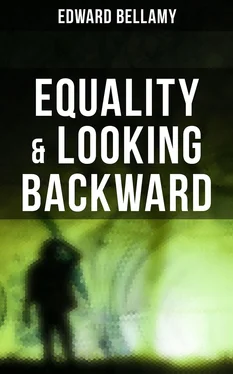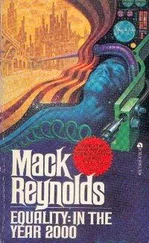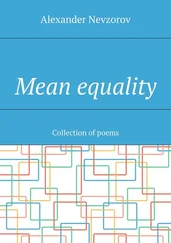Had its theme been yet more incredible, the circumstantiality of this narrative, as well as the impressive manner and personality of the narrator, might have staggered a listener, and I had begun to feel very strangely, when, as he closed, I chanced to catch a glimpse of my reflection in a mirror hanging on the wall of the room. I rose and went up to it. The face I saw was the face to a hair and a line and not a day older than the one I had looked at as I tied my cravat before going to Edith that Decoration Day, which, as this man would have me believe, was celebrated one hundred and thirteen years before. At this, the colossal character of the fraud which was being attempted on me, came over me afresh. Indignation mastered my mind as I realized the outrageous liberty that had been taken.
“You are probably surprised,” said my companion, “to see that, although you are a century older than when you lay down to sleep in that underground chamber, your appearance is unchanged. That should not amaze you. It is by virtue of the total arrest of the vital functions that you have survived this great period of time. If your body could have undergone any change during your trance, it would long ago have suffered dissolution.”
“Sir,” I replied, turning to him, “what your motive can be in reciting to me with a serious face this remarkable farrago, I am utterly unable to guess; but you are surely yourself too intelligent to suppose that anybody but an imbecile could be deceived by it. Spare me any more of this elaborate nonsense and once for all tell me whether you refuse to give me an intelligible account of where I am and how I came here. If so, I shall proceed to ascertain my whereabouts for myself, whoever may hinder.”
“You do not, then, believe that this is the year 2000?”
“Do you really think it necessary to ask me that?” I returned.
“Very well,” replied my extraordinary host. “Since I cannot convince you, you shall convince yourself. Are you strong enough to follow me upstairs?”
“I am as strong as I ever was,” I replied angrily, “as I may have to prove if this jest is carried much farther.”
“I beg, sir,” was my companion’s response, “that you will not allow yourself to be too fully persuaded that you are the victim of a trick, lest the reaction, when you are convinced of the truth of my statements, should be too great.”
The tone of concern, mingled with commiseration, with which he said this, and the entire absence of any sign of resentment at my hot words, strangely daunted me, and I followed him from the room with an extraordinary mixture of emotions. He led the way up two flights of stairs and then up a shorter one, which landed us upon a belvedere on the house-top. “Be pleased to look around you,” he said, as we reached the platform, “and tell me if this is the Boston of the nineteenth century.”
At my feet lay a great city. Miles of broad streets, shaded by trees and lined with fine buildings, for the most part not in continuous blocks but set in larger or smaller inclosures, stretched in every direction. Every quarter contained large open squares filled with trees, among which statues glistened and fountains flashed in the late afternoon sun. Public buildings of a colossal size and an architectural grandeur unparalleled in my day raised their stately piles on every side. Surely I had never seen this city nor one comparable to it before. Raising my eyes at last towards the horizon, I looked westward. That blue ribbon winding away to the sunset, was it not the sinuous Charles? I looked east; Boston harbor stretched before me within its headlands, not one of its green islets missing.
I knew then that I had been told the truth concerning the prodigious thing which had befallen me.
Table of Contents
I did not faint, but the effort to realize my position made me very giddy, and I remember that my companion had to give me a strong arm as he conducted me from the roof to a roomy apartment on the upper floor of the house, where he insisted on my drinking a glass or two of good wine and partaking of a light repast.
“I think you are going to be all right now,” he said cheerily. “I should not have taken so abrupt a means to convince you of your position if your course, while perfectly excusable under the circumstances, had not rather obliged me to do so. I confess,” he added laughing, “I was a little apprehensive at one time that I should undergo what I believe you used to call a knockdown in the nineteenth century, if I did not act rather promptly. I remembered that the Bostonians of your day were famous pugilists, and thought best to lose no time. I take it you are now ready to acquit me of the charge of hoaxing you.”
“If you had told me,” I replied, profoundly awed, “that a thousand years instead of a hundred had elapsed since I last looked on this city, I should now believe you.”
“Only a century has passed,” he answered, “but many a millennium in the world’s history has seen changes less extraordinary.”
“And now,” he added, extending his hand with an air of irresistible cordiality, “let me give you a hearty welcome to the Boston of the twentieth century and to this house. My name is Leete, Dr. Leete they call me.”
“My name,” I said as I shook his hand, “is Julian West.”
“I am most happy in making your acquaintance, Mr. West,” he responded. “Seeing that this house is built on the site of your own, I hope you will find it easy to make yourself at home in it.”
After my refreshment Dr. Leete offered me a bath and a change of clothing, of which I gladly availed myself.
It did not appear that any very startling revolution in men’s attire had been among the great changes my host had spoken of, for, barring a few details, my new habiliments did not puzzle me at all.
Physically, I was now myself again. But mentally, how was it with me, the reader will doubtless wonder. What were my intellectual sensations, he may wish to know, on finding myself so suddenly dropped as it were into a new world. In reply let me ask him to suppose himself suddenly, in the twinkling of an eye, transported from earth, say, to Paradise or Hades. What does he fancy would be his own experience? Would his thoughts return at once to the earth he had just left, or would he, after the first shock, wellnigh forget his former life for a while, albeit to be remembered later, in the interest excited by his new surroundings? All I can say is, that if his experience were at all like mine in the transition I am describing, the latter hypothesis would prove the correct one. The impressions of amazement and curiosity which my new surroundings produced occupied my mind, after the first shock, to the exclusion of all other thoughts. For the time the memory of my former life was, as it were, in abeyance.
No sooner did I find myself physically rehabilitated through the kind offices of my host, than I became eager to return to the house-top; and presently we were comfortably established there in easy-chairs, with the city beneath and around us. After Dr. Leete had responded to numerous questions on my part, as to the ancient landmarks I missed and the new ones which had replaced them, he asked me what point of the contrast between the new and the old city struck me most forcibly.
“To speak of small things before great,” I responded, “I really think that the complete absence of chimneys and their smoke is the detail that first impressed me.”
“Ah!” ejaculated my companion with an air of much interest, “I had forgotten the chimneys, it is so long since they went out of use. It is nearly a century since the crude method of combustion on which you depended for heat became obsolete.”
“In general,” I said, “what impresses me most about the city is the material prosperity on the part of the people which its magnificence implies.”
Читать дальше










